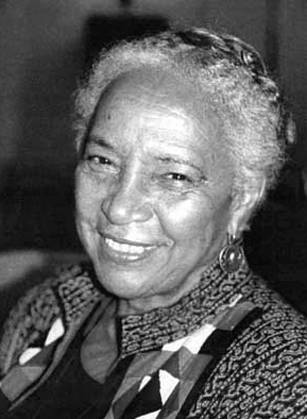Blog by Cristina Hanganu-Bresch

Today we honor Margaret Morgan Lawrence (1914-2019), a psychiatrist and psychoanalyst, trailblazer pioneer in children’s community health.
Lawrence had a storied career that was threatened at many turns by the intersection of racism and sexism. A graduate of Cornell in 1936 (when dorms were still segregated), she was denied entrance at Cornell’s medical school because of her race, and later on she was denied a residency at New York Babies Hospital. She persevered and earned her medical degree from Columbia, the third African American woman to do so (and the only one in her year in 1940). She later returned to Columbia for a master’s in Public Health, and in 1947 she became an associate professor at the same hospital that had denied her residency application. Later she became the first African American member of the New York State Psychiatric Institute as well as the first African American certified in psychoanalysis at Columbia University.1 Her pediatric residency at Harlem Hospital solidified her lifelong interest in child and adolescent psychiatry, as well as her specialization in children’s resilience—especially that of inner city, Black, and disadvantaged youth in the face of enormous adversities.
At a time when her colleagues doubted that Black mothers and children could benefit from therapy and psychoanalysis, she advocated for the mental health of communities of color and co-founded the Rockland County Center for Mental Health, as well as was a founding board member of the Harlem Family Institute. Her two books on children’s mental health reflect her research interests and psychiatric practice at the Harlem Hospital; the second is devoted to the topic of inner strength in young inner city families. In there she recounts her own path to becoming a doctor and some of the racist incidents that punctuated her intellectual formation:
History, in fact and symbol, contains the germ of the future. In my own lifetime, I walked across the street from my childhood Mississippi home again and again to hear the story of a doctor-husband tarred and feathered and run out of town because he dared to treat white patients. Years later, in Washington Heights, Manhattan, while a medical student at Columbia Medical Center, intending to vote for the first time for a president of the United States, I had to take a “literacy test.” I framed that certificate of literacy. On the same streets, I had several offers of “day work.”2
The book tells stories of resilience and interventions that were meant to cultivate that strength that she saw as a defining characteristic of inner city children born and raised in adverse conditions such as poverty and system racism. She understood mental health was linked to social context and multiple forms of marginalization,[3] and she highlighted those topics in a statement she contributed to “Crisis in Child Mental Health: Challenge for the 1970s,” a report of the Joint Commission on Mental Health of Children:
Poverty, in this the richest of world powers, is still our heritage. Racism, in a country dedicated to its people’s inalienable rights, speaks as clearly of ‘man’s inhumanity to man’ as did slavery.[4]
Nevertheless, Lawrence saw strength, love, and beauty flourishing in communities that had endured hundreds of years of oppression; and she saw it as the duty of the psychiatrist to recognize that strength, in whatever forms it presented itself. Her story is also told in the biography Balm in Gilead: Journey of a Healer, written by her daughter, Sara Lawrence-Lightfoot.
References:
1. Changing the face of medicine: Dr. Margaret Morgan Lawrence. https://cfmedicine.nlm.nih.gov/physicians/biography_195.html
2. Margaret Morgan Lawrence. Young inner city families: development of ego strength under stress. New York Behavioral Publications, 1975.
3. Katharine Q. Seelye Margaret Lawrence, 105, Dies; Pioneering Black Female Psychoanalyst. The New York Times, Dec. 8, 2019. https://www.nytimes.com/2019/12/08/obituaries/margaret-lawrence-dead.html
4. Margaret Morgan Lawrence. Young inner city families: development of ego strength under stress. New York Behavioral Publications, 1975.